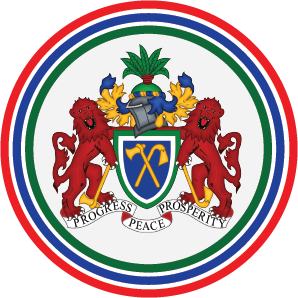FAQs
frequently
asked questions
Welcome to the FAQ page. Here, you’ll find answers to common questions about government services, policies, and procedures. Our aim is to provide helpful and clear information to assist you.
The president of the Republic of The Gambia, H.E. Adama Barrow, has led since January 2017 after defeating Yahya Jammeh, ending Jammeh’s 22-year rule. A former businessman, Barrow focuses on democratic reforms, economic development, and human rights. He won re-election for a second term in December 2021.
The Gambia gained independence from the United Kingdom on February 18, 1965, with Sir Dawda Kairaba Jawara as its first Prime Minister and later President. This day, marking the end of British rule, is celebrated annually as Independence Day, honoring Gambia’s freedom and sovereignty.
The official language of The Gambia is English. This is due to its history as a British colony, and English remains the language used in government, education, and formal settings. However, local languages such as Mandinka, Wolof, Fula, and Jola are widely spoken in daily life.
As of 2024, The Gambia’s population is approximately 2.42 million, with a steady growth rate around 2.5% annually.
For The Gambia, recommended vaccinations include Hepatitis A and B, typhoid, and tetanus. Yellow fever vaccination is required if coming from a risk area, and malaria prophylaxis is advised due to malaria presence.
To apply for a driving license in The Gambia, visit the Department of Transport in Banjul or regional licensing offices. You’ll need ID, a medical certificate, and to pass both written and practical tests. Fees apply, and a licensed driving school can help prepare you.
To apply for a business license or permit in The Gambia, visit the Gambia Revenue Authority (GRA) office in Banjul or any regional branch. You’ll need to register your business, submit identification, and provide business details. Pay the required fees, which vary based on business type and size, then await approval. Which can take 1 to 2 weeks.
To apply for a passport in The Gambia, visit the Department of Immigration with a completed application form, valid ID, passport photos, and payment. Proof of citizenship may be required. After submission, you’ll be notified when your passport is ready for collection.
To apply for a visa to The Gambia, you need to complete a visa application form, provide a valid passport, recent passport-sized photos, and pay the required visa fee. Submit these documents to the nearest Gambian embassy or consulate. Processing times and additional requirements may vary, so it’s best to contact the embassy for specific details.
To apply for a Gambian National ID, visit an immigration office with a birth certificate or passport. Fill out the application, complete fingerprinting and a photo, pay the fee, and await notification for collection.
A good time to visit The Gambia is during the dry season, from November to February, when the weather is cooler and more comfortable for exploring.
Kololi and Kotu are ideal for tourists seeking convenience, lively beaches, and nightlife, while Bakau offers a more local vibe with cultural sites. For tranquility, Bijilo and Sanyang provide peaceful beaches and nature spots, perfect for a serene, off-the-beaten-path experience.
While visiting The Gambia, one should not miss the opportunity to sample its notable local dishes. Domoda is a rich peanut stew accompanied by meat; Benachin, known as Jollof rice, offers a flavorful one-pot preparation; Yassa features marinated chicken or fish in a tangy sauce; Superkanja is a nutritious okra stew; and Chura-Gerté is a sweet rice porridge. These dishes exemplify the rich flavors of Gambian cuisine.
Top Gambian souvenirs include handwoven baskets, wood carvings, batik fabrics, and jewelry made from natural materials. Unique items like Kora instruments and locally produced peanut butter are also popular. You’ll find these at local markets, especially in Serekunda and Bakau, offering an authentic taste of Gambian culture.

